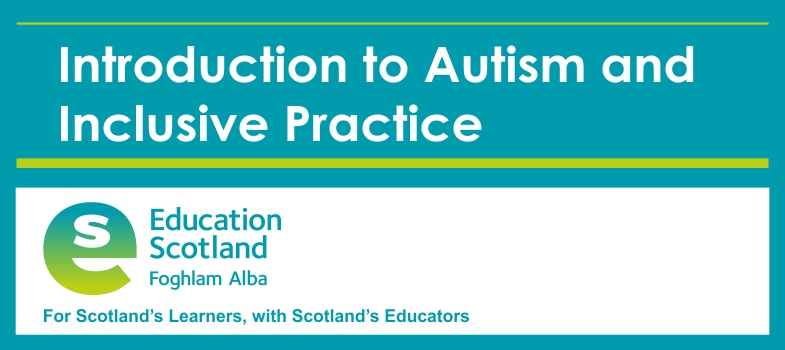4.5 Partnership working and roles
Supporting learners is a collaborative process that involves effective partnership working between professionals, families and the learner, where possible. This is particularly important and helpful when identifying and planning support for an autistic learner.
The role and views of the parents, carers, and child or young person are extremely important and can provide valuable information to support assessment and monitoring. Learning targets are more likely to be reinforced at home if parents have also been centrally involved in planning.
Planning is considered to be most effective when the young person's views are taken into account. There is a clear consensus that joint planning at the earliest possible stage is most helpful in meeting children's and young people's needs. Early and good communication between education staff, allied health professionals and parents is more likely to lead to coordinated and appropriate planning, support and monitoring for each individual child.
Professional roles and responsibilities
Activity 14
- Select the heading to reveal an explanation of professional roles and responsibilities.
- In your Reflective Log, answer the two questions which focus on your experience of roles, responsibilities and collaboration.
Select the headings to reveal an explanation of professional roles and responsibilities.
Education authorities
Answer
Education authorities are required to identify and support the additional support needs of each child or young person for whose school education they are responsible. They should:
- Provide transparent information and guidelines to staff and the public on their processes to support additional needs.
- Provide appropriate professional development opportunities.
- Ensure that the entitlements of Curriculum for Excellence are available and that the legal frameworks are followed.
Classroom teacher
Answer
Support for all learners begins within the classroom and is provided by the classroom teacher who holds the main responsibility for nurturing, educating and meeting the needs of all pupils in their class, and who also ensures early identification of pupils' additional support needs, plans, delivers and reviews curriculum programmes.
However, this does not mean that class teachers are responsible for the formal identification of autism. It means that they play an important role in the initial stages and the continuing monitoring and assessment of learning – as they do for all their pupils.
The principles for the assessment of additional support needs are no different to those for Curriculum for Excellence. Information that is gathered on a daily basis by class teachers as part of their curriculum moderation and assessment can provide a significant contribution to support assessment. The information gathered reflects the learner’s presentation in class and can include examples of:
- Observations e.g. how the learner interacts with peers and staff.
- Examples of work carried out in class.
- Opportunities for dialogue with the learner and their family to establish strengths and areas of difficulties.
Support for Learning teacher (SfL/ASN teacher)
Answer
The Support for Learning or Additional Support Needs teacher works in partnership with parents and appropriate practitioners to meet the additional support needs of children and young people within their local authority's staged intervention process. They assist class teachers and school management to ensure that children who have additional needs have those needs identified and met within Curriculum for Excellence.
Support should be delivered through the five well-established roles of the Support for Learning teacher, which are all complementary and are explained below.
- Consultancy/Consultation (SfL/ASN teacher)
- Planning learning and teaching (including delivering team/cooperative teaching with class teachers) (SfL/ASN teacher)
- Identification and assessment (SfL/ASN teacher)
- Partnership with Specialist colleagues/agencies (SfL/ASN teacher)
- Contributing to Professional Development (SfL/ASN teacher)
Educational Psychologist
Answer
The role of the Educational Psychologist within local authority schools is to offer advice and intervention to young people, parents, schools and the Education Service. The identification of autism within the school setting is not carried out by an Educational Psychologist. However, they may provide consultation on the assessment, identification and educational planning for autistic learners.
This may include working:
- with individual pupils and the staff who support them in contributing to the assessment process and giving advice on learning approaches
- with staff in reviewing assessment methods and evidence of dyslexic difficulties, as well as providing staff development and training.
Occupational Therapist (OT)
Answer
Autism is a social communication difference and autistic learners will experience difficulties with social and practical skills – this will vary considerably from individual to individual. Where these difficulties affect the child's everyday life, the role of a Children's Occupational Therapist is to work with families, teachers and others to assess the difficulties the child is having with these skills. They will then advise children and families on how they can participate in daily activities to enable them to become as physically, psychologically and socially independent as possible. This includes general self-care, school, work and play/leisure (dependent on the age of the child or young person). They may also investigate sensory processing difficulties. With permission from the family or young person if they have capacity, this advice and support is shared with the school through child-centred partnership working.
Requests for assistance for Occupational Therapy Services can come from a variety of sources and this varies across the country. All referrers must ensure the request is made with the parents' consent.
Physiotherapist
Answer
Some autistic learners may experience physical movement problems. Physiotherapists work with children and young people with movement disorders, their parents/carers, teachers and others. The aim of the physiotherapist is to help the child or young person reach their full potential through providing physical intervention, advice and support.
Referrals to physiotherapy can come from a variety of sources and this varies across the country. All referrers must ensure the referral is made with the parents' consent.
Speech and Language Therapist (SLT)
Answer
Autistic learners experience speech, language, communication and social interaction difficulties, affecting non-verbal and verbal communication and/or social understanding or social communication difficulties. They may present at a preverbal stage of communication and at all stages up to being verbal and articulate with language.
The role of the Speech and Language Therapist is to work with children and young people with a range of neurodevelopmental difficulties (including autism), parents/carers, teachers, health visitors and others to assess the child's developmental progress and how this impacts on everyday communication, play and engagement in a range of contexts (e.g. home, school and in the community or with friends). This assessment is then considered in planning to meet the child's needs through a range of supports and interventions at a universal, targeted and specialist level.
Speech and Language Therapists are core members of diagnostic assessment teams and also work collaboratively to enable the child or young person to be successful communicators and to support those around them to adapt their environment and communication styles to support communication, reduce anxiety and distress, and build social relationships.
Requests for assistance around understanding and supporting communication or for diagnostic assessment can usually be made directly to the local SLT department through local pathways and guidance.
Back to index [Tip: hold Ctrl and click a link to open it in a new tab. (Hide tip)]
4.4 Autism support, planning and monitoring

